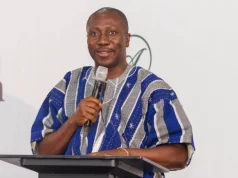In a refreshing departure from the usual proceedings, Members of Parliament (MPs) on Friday turned the House into a vibrant tapestry of Ghana’s linguistic diversity by delivering contributions in their local languages.
The unique session, which saw lawmakers express themselves in tongues ranging from Ahanta to Ewe, Ga, and Dagbani, highlighted the rich cultural heritage of the nation while adding a distinctive flair to parliamentary debate.
The initiative, which appeared to be spontaneous, allowed MPs to connect more deeply with their roots and constituencies. Christian Yalley, MP for Effia, seized the opportunity to address the House in Ahanta, his mother tongue. His speech, punctuated by traditional proverbs and idioms, drew applause from colleagues and spectators alike. “It’s not just about speaking; it’s about preserving our identity and making Parliament more inclusive,” Yalley remarked after his address.
Other MPs followed suit, with each contribution offering a glimpse into Ghana’s linguistic mosaic. The Speaker of Parliament, Alban Bagbin, presided over the session with visible enthusiasm, occasionally joining in the cultural exchange by interpreting or commenting on the unique phrases used by members.
The move was widely praised as a step toward making parliamentary proceedings more relatable to the average Ghanaian. “This is what democracy should look like—a reflection of the people,” said one observer in the public gallery. “When MPs speak in the languages of their constituents, it bridges the gap between the House and the grassroots.”
While English remains the official language of Parliament, Friday’s session demonstrated the potential for local languages to enrich debates and foster a deeper connection between lawmakers and the communities they represent. As the House adjourned, there were calls for such cultural expressions to become a regular feature of parliamentary proceedings, ensuring that Ghana’s linguistic heritage continues to thrive in its highest deliberative body.
For now, the unique debate stands as a testament to the power of language—not just as a tool for communication, but as a vessel for culture, identity, and unity.
Send your news stories to newsghana101@gmail.com
Follow News Ghana on Google News















